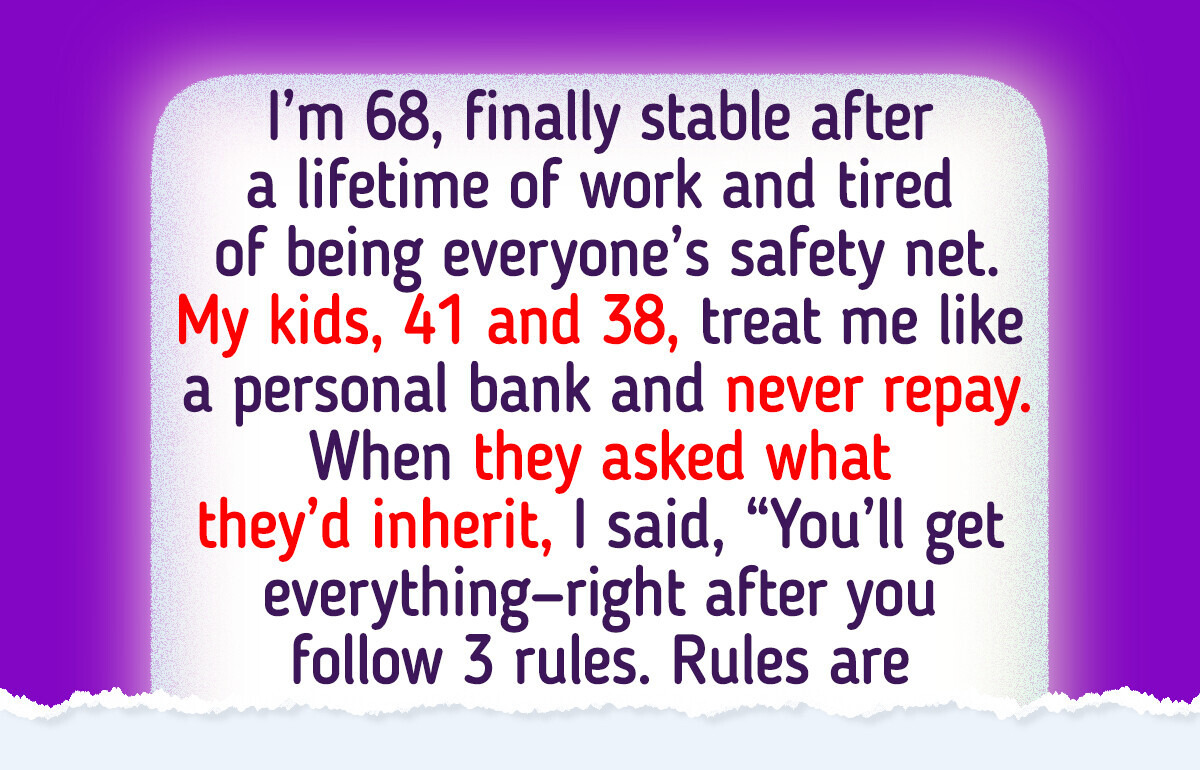Wow your a great teacher what will happen when you won't be there . They would become broke
I Refuse to Leave Inheritance to My Kids Until They Follow These 3 Rules

Every so often, we receive a letter that stirs up a quiet storm — not because it’s cruel, but because it’s honest. This one came from a reader who spent decades putting her children first, only to realize that love without boundaries can turn into entitlement. Her story isn’t about punishment — it’s about teaching self-respect, even when it comes wrapped in tough love.
I’m 68, widowed, and after a lifetime of saving, my house is paid off, and my retirement fund is finally comfortable. I’m not rich — just steady.
I have two adult kids. My daughter, 41, has a good job, but she constantly complains that “life’s unfair” and expects help with every bump in the road. My son, 38, hasn’t kept a job longer than a year and still asks me to “lend” him money I never see again.
For years, I’ve said yes — because I thought that’s what love was.
But lately, I’ve started to see something else: entitlement disguised as family.
When they started asking about inheritance (“You’ll leave us the house, right?”), I decided to change the script.
At dinner one Sunday, I told them calmly:
“You’ll both get your inheritance — when you’ve followed three simple rules.”
They laughed until they realized I wasn’t joking.
Rule #1: Have one full year of living expenses saved.
If you can’t manage your own finances, you’re not ready to manage mine.
Rule #2: No debt from choices you could control.
That means no gambling, no “get-rich-quick” investments, and no unpaid credit card bills that were really just vacations.
Rule #3: Give back before you get.
Volunteer, mentor someone, donate — I don’t care how, but prove you understand the value of what you have.
My son stormed off. My daughter called me manipulative.
I told them both:
“I’m not punishing you. I’m preparing you. Money should make you stronger, not softer.”
We didn’t talk for a while. But last month, my daughter sent me a photo — she’d just finished a financial literacy course and started a savings account for her kid.

We want to thank our reader for sharing such a raw and thoughtful story. It’s never easy to say “no” to your own children — especially when you’ve spent a lifetime saying “yes.” But as this letter reminds us, setting limits isn’t selfish. It’s one of the most meaningful ways to help the next generation grow up, take responsibility, and understand that real love sometimes sounds like accountability.
Psychological Insight #1: The Importance of Boundaries with Adult Children
When parents continue giving without limits to their adult children, it typically isn’t generosity alone — it can become enabling. Setting boundaries with adult children helps promote mutual respect, supports the child’s independence, and protects the parent’s mental and emotional well-being.
In other words: withholding an inheritance until conditions are met isn’t just about money — it’s a structured boundary that says “I respect both you and myself.”
Psychological Insight #2: Entitlement vs. Autonomy in Family Relationships
Research shows that in many families, adult children may expect inheritance or ongoing financial support as a right rather than as a partnership. Unresolved parent-adult child dynamics — especially where children remain dependent — can lead to estrangement or conflict.
The implication is that when a parent puts conditions on inheritance, they may be shifting from the role of provider to the role of mentor: saying “You earned this” instead of “You’re owed this.”
Psychological Insight #3: Intergenerational Boundaries and Emotional Health
A study published in the Journal of Child and Family Studies found that unclear or blurred boundaries between generations — where parents and adult children interfere in each other’s lives or finances — are associated with lower marital satisfaction and poorer family functioning.
In the context of inheritance and adult child dependence, this suggests that by requiring rules for receiving one’s estate, a parent may actually be promoting healthier structural boundaries, which benefit the long-term well-being of both parties.
Setting financial rules for inheritance isn’t cold or cruel — it’s a final act of guidance, teaching responsibility long after the lessons of childhood.
15 Moments That Remind Us Kindness Is the Power the World Forgot
Comments
How do you know that you will even have anything to leave for them? You may need your house as collateral for medical bills, or a live in caregiver. Those kind of things happen all the time. Parents should, NEVER tell their kids what they are INHERITING, because they will start planning on how to spend it, before they get it. I think that your 3 rules are sensible and I am happy for you that your daughter is taking it seriously. If your son's only interest is in what he will get, then he should not get anything. Enjoy your retirement and I pray that you have a long, happy, peaceful life.
Do you know how many times family members has been murdered for what others thought they were entitled to and didn't want to wait. They have had parents declared mentally unable to manage their lives and appointed themselves executive or gotten a POA. There is a guy that did his father in and less than a year later his mother died of an unknown reason. He took control of the family business. Some of the family knew but feared for their safety, so they shut up. Husband and wives, grands and cousins have done it as well. The Mendez brothers are not the only one, but they were made as example mostly because of the origin of surname.
Related Reads
My Sister Tried to Turn Our Family Cabin Into Her Free Resort, So I Changed the Rules

My Daughter Thought She Was Above Me, I Let Reality Prove Her Wrong

I Canceled New Year Dinner at My Place—I Won’t Pay Again for Everyone

10 Moments That Remind Us Kindness Is a Quiet Shelter in a Chaotic World

10 Teachers Who Learned Life Lessons From Their Remarkable Students

I Quit After My Boss Punished Me for Attending My Mom’s Surgery

15 Real-Life Moments That Prove Quiet Kindness Is a Real Power Move

12 Times Kindness Stopped Damage From Becoming Destiny

18 Stories That Prove Living in an Apartment Is Like Having a Front-Row Seat to a Comedy Show

10 Times a Moment of Pure Cruelty Was Actually a Secret Act of Kindness

I Refused to Help My Dad With His Hospital Bills, I’m Not Here to Rescue Him

14 Quite Acts of Kindness That Changed Someone’s Life Forever

